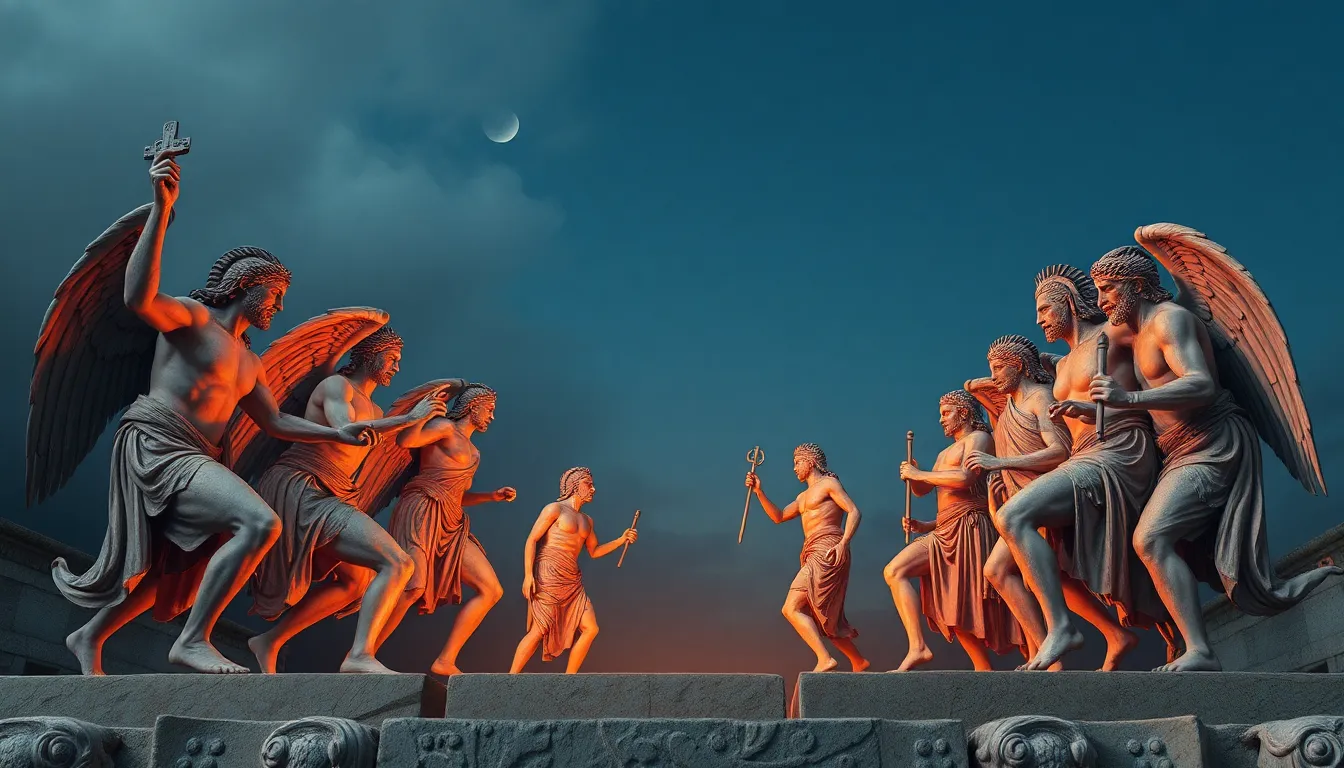The Furies and the Concept of Honor in Greek Culture
I. Introduction
The Furies, known as the Erinyes in Greek mythology, are formidable deities associated with vengeance and moral retribution. They play a crucial role in the mythological landscape, embodying the consequences of violating sacred laws and social codes. In ancient Greek society, honor (timē) was of paramount importance, dictating personal behavior and societal interactions. This article aims to explore the intersection of the Furies and the concept of honor in ancient Greece, illustrating how these themes intertwine to reflect the values and beliefs of the time.
II. Understanding the Furies
The Furies originated from the blood of Uranus when he was castrated by his son Cronus, symbolizing a primal force of nature that seeks to enforce justice through vengeance. Their primary roles include:
- Punishing those who commit grave offenses, particularly against family and kin.
- Enforcing moral order and societal norms, ensuring that individuals uphold their honor.
- Serving as a reminder of the inescapability of guilt and the consequences of wrongdoing.
Symbolically, the Furies represent the darker aspects of retribution, often depicted as terrifying figures with snakes for hair and wings. They are closely connected to the concepts of familial and societal honor, acting as enforcers of the moral code that governs relationships within families and communities.
III. The Concept of Honor in Greek Culture
In ancient Greece, honor (timē) was more than a personal attribute; it was a societal imperative. It encompassed the following aspects:
- Family Honor: The reputation of one’s family was paramount, and individuals were expected to act in ways that brought glory to their lineage.
- Social Status: Honor was intrinsically linked to one’s status in society, affecting political and personal relationships.
- Personal Integrity: Upholding one’s honor required a commitment to moral and ethical behavior, often leading to public recognition.
Dishonor could bring severe consequences, including social ostracism, loss of status, and even death. The shame associated with dishonor extended beyond the individual, often impacting their family and community.
IV. The Furies as Enforcers of Honor
The Furies serve as a direct response to violations of honor, punishing transgressors who disrupt the moral and social order. One of the most notable cases is that of Orestes, who avenges his father’s murder by killing his mother, Clytemnestra. This act of vengeance sets off a cycle of retribution:
- Orestes is pursued by the Furies for the act of matricide, illustrating the inescapable nature of their justice.
- His subsequent trial in Athens represents a turning point, where the Furies evolve from vengeful spirits to agents of justice.
The Furies’ role is essential in maintaining social order, as their presence serves as a deterrent against dishonorable actions. They embody the belief that justice must be served, particularly in familial disputes where honor is at stake.
V. The Relationship Between Honor and Justice
The interplay between personal honor and divine justice is a recurring theme in Greek mythology. The Furies initially symbolize retribution, but their role evolves over time:
- They transition from vengeful spirits to more complex agents of justice, reflecting changes in Greek thought.
- The trial of Orestes marks a shift towards a more restorative approach to justice, where the focus is on resolving conflicts rather than perpetuating cycles of vengeance.
This evolution highlights a broader philosophical shift in ancient Greece, moving from strict retribution to a more nuanced understanding of justice and ethical behavior.
VI. Literary Representations of the Furies and Honor
Literary texts, particularly Aeschylus’ “Oresteia,” provide profound insights into the themes of the Furies and honor. Key aspects include:
- Analysis of the Furies: In “Oresteia,” the Furies are depicted as relentless forces of vengeance, driving Orestes to madness before ultimately transforming into the Eumenides, benevolent protectors of justice.
- Consequences of Honor: The narratives illustrate how the pursuit of honor can lead to tragic outcomes, emphasizing the moral complexities of revenge.
- Cultural Impact: These representations have shaped Greek cultural values, reinforcing the significance of honor and the dire consequences of its violation.
VII. The Furies in Contemporary Culture
Modern interpretations of the Furies continue to resonate, finding their way into literature, art, and popular media. Their portrayal reflects ongoing discussions about justice and morality:
- Adaptations: The Furies appear in various forms, from feminist interpretations to representations in horror genres, symbolizing the struggle for justice.
- Legacy of Honor: The concept of honor remains relevant today, influencing social norms and personal conduct in contemporary society.
- Relevance in Justice Discussions: The Furies’ evolution highlights the complexities of justice, serving as a metaphor for societal debates about retribution versus rehabilitation.
VIII. Conclusion
In summary, the Furies and the concept of honor are deeply intertwined in Greek culture, reflecting the values and beliefs of a society that revered moral order and social integrity. The Furies serve as both enforcers and symbols of justice, illustrating the consequences of dishonor and the complexity of human relationships. Their literary representations and modern adaptations underscore the enduring significance of these themes, offering insights into contemporary discussions of morality and justice. Ultimately, understanding the Furies and honor provides a rich perspective on the cultural heritage of ancient Greece and its relevance today.




